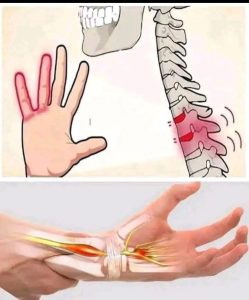Have you ever been doing nothing out of the ordinary when your hands suddenly became numb or you noticed a weird tingling feeling in your fingers? Although it’s usually benign and transient, paresthesia—that strange, tingly sensation—can occasionally indicate a more serious condition.

The tingling, numbness, or “falling asleep” sensation that most of us have encountered at some point is known medically as paraesthesia. When you wake up after sleeping in an odd position or after spending too much time resting on your elbow, you may sense it.
Usually, when the pressure is released, it disappears on its own. It might, however, indicate an underlying medical issue that requires treatment if it becomes more regular, lasts longer than a few minutes, or is accompanied by additional symptoms like pain or weakness.
Your hands may feel tingly or numb for a number of typical reasons. Long-term pressure or bad posture are two of the most common reasons. Have you ever slept on an arm and woken up with a numb arm? Nerves can be momentarily compressed or blood flow restricted by lying in an awkward position or applying pressure to them, such as by placing your wrist or elbow on a hard surface. Usually temporary, this kind of paraesthesia gets better as soon as circulation is restored.
Carpal tunnel syndrome is an additional frequent cause. If you spend a lot of time using a keyboard or making repetitive hand motions, this is very likely to happen. The compression of the median nerve as it travels through the wrist causes carpal tunnel syndrome, which causes tingling, numbness, discomfort, and even weakness in the hand, especially in the thumb, index, and middle fingers.
Circulatory problems may also be involved. Nerve health depends on proper blood flow, and diseases like diabetes, hypertension, or vascular disease can impair circulation to the extremities. A persistent or recurrent feeling of tingling or numbness in the hands and feet could result from this.
It’s normally nothing to be concerned about if you occasionally get numb hands from sleeping incorrectly or leaning on your arm. However, it’s a good idea to consult a doctor if the numbness occurs frequently, lasts longer than a few minutes, affects both hands or other places, or is accompanied by discomfort, swelling, or weakness. If the sensation affects your sleep or everyday activities, or if you already have a medical problem such as diabetes, arthritis, or nerve damage, it’s worth getting checked out.
Occasionally experiencing a slight tingling sensation in your hands is normally nothing to be alarmed about; it’s your body alerting you to a temporary problem. However, if it begins to occur frequently, it may be your body’s way of alerting you to a more serious problem, such as nerve compression, circulation issues, or an underlying illness.
Listening to your body is crucial as usual. When in doubt, seek the advice of a medical expert to ensure the correct diagnosis and maintain the health and condition of your hands.